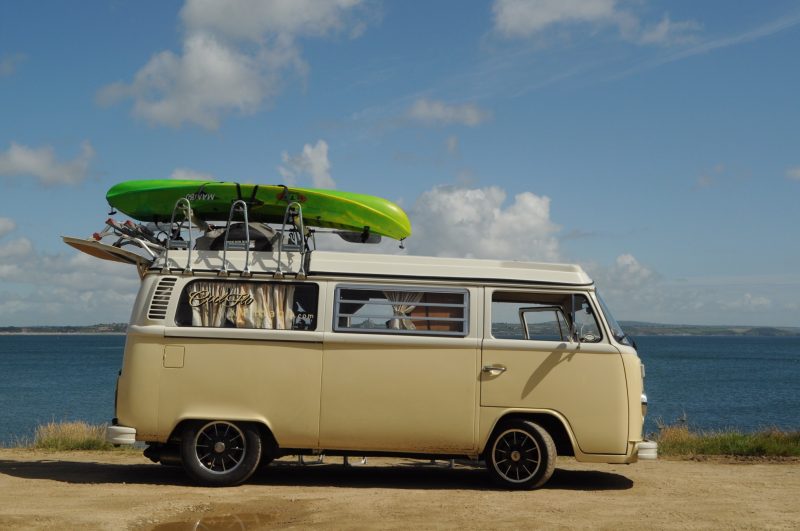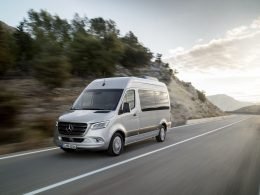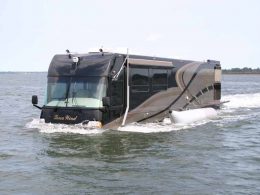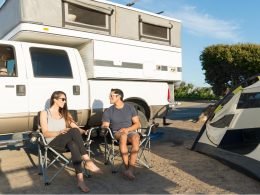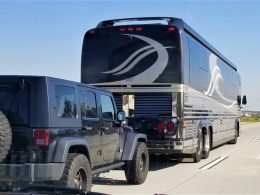The larger the RV, the more space there is for luxuries. But bigger isn’t always better. Bigger also means that you have to find larger parking spots and maneuver in and out of them. Sometimes smaller is better when it comes to RVs.
Let’s take a look at why.
Is Smaller Better When It Comes to RVs?
Some benefits come with a larger RV. You have more space to move about, more room for more things like a dishwasher or washer/dryer, and the ability to bring along more of the things that feel special to you. But this can be a double-edged sword. A smaller RV forces you to downsize. This can actually be quite freeing.
There are many other benefits to going smaller when it comes to RVing. Giving up a little space can make your life on the road much less stressful than driving a monster-sized class A.

Benefits of Small RVs and Travel Trailers
Small RVs and travel trailers provide many benefits over larger rigs. They typically come with better gas mileage, they’re easier to maneuver, they can fit into regular parking spaces, some have better off-road capabilities, they can access campsites that are too small for larger RVs, and they have fewer restrictions.
Better Gas Mileage
A bigger rig means heavier weight, which usually equates to lower gas mileage. A smaller, lighter rig comes with better gas mileage. Many bigger rigs also use diesel. Most smaller rigs use gas. Gasoline is easier to locate, which is another benefit to most smaller rigs.
Easier to Maneuver
Maneuverability is another tremendous benefit of smaller rigs, particularly for folks who are new to RVing. If you’ve never driven a bigger rig, sitting behind the wheel of a 40-foot-plus class A or a lengthy fifth wheel can be intimidating.
These larger rigs make it harder to see where you’re going, not only when backing up but even when making a turn. You can clip corners and other vehicles if you aren’t used to how they maneuver.
A smaller rig is closer to driving a passenger vehicle and can ease the transition from car to RV. Smaller rigs turn like passenger vehicles. You might even opt for something like a Sprinter Van, which is basically a large passenger van.
Can Fit into Regular Parking Spots
Many smaller rigs can fit into regular parking spaces, making them more versatile when you want to stop at a restaurant, brewery, or other attraction. When driving larger rigs, it can be quite a chore to figure out where to park. With larger rigs, you might have to park at a site before taking a tow vehicle back to town. It’s very difficult to find big rig parking other than the back of the parking lot at a big box store or supermarket.

Better Off-Road Capability for Some
Big rigs are notoriously bad at handling rough roads. Many smaller rigs, because they’re lighter and have better clearance, can go down rougher roads. This is great when you want to get off-grid and closer to nature.
Access More Types of Campsites
One of the greatest benefits of a smaller rig is it opens up access to many more campsites. A bigger rig needs more space to park and more room to maneuver at a park. But a smaller rig can fit in a tighter space.
This is especially helpful when you go boondocking. In a smaller rig, there’s less chance that you’ll have to turn around and find a new spot. In fact, with a bigger rig, you may not even be able to turn around. You might have to back out of a spot where you won’t fit.
There are also numerous national and state parks that have limited space. Especially if an area is more remote or has restrictions, it might not accommodate larger rigs.
Fewer Restrictions
Even a day visit at a national park can be limiting, as many park roads are restricted for larger rigs, whereas a smaller RV can maneuver the roads quite well. There are also scenic roads across the country that can’t handle the size or weight of larger rigs. But if you travel in a van or even with a smaller travel trailer, you can enjoy these roads.
For instance, Glacier National Park is famous for its Going To The Sun Road and its vehicle restrictions. Vehicles on Going To The Sun Road can’t exceed 21 feet long, 10 feet tall, or eight feet wide. Many smaller rigs still fit within these limitations.
If Smaller Sounds Better, Check Out These Cons of Smaller RVs
Okay, so you’re sold on the glories of a smaller rig. But some of these benefits can be cons in their own right. Let’s see what the downsides to a small rig are.
Much Less Storage Space
A smaller rig comes with much less storage space. This is a significant reason why people opt for a bigger RV. If there are many things that you want to have with you wherever you go, you need somewhere to store them. You could run out of space in a smaller rig.
Not Great for Families
Except in rare instances, a smaller RV can be tough for families. As much as kids love their parents and parents love their kids, sometimes everyone needs their own space. That just isn’t possible in a lot of smaller rigs.
Not Ideal for Full-Timing
Many people find smaller rigs limiting when it comes to living the full-time RV life. If you’re full-time, there are going to be days where the weather doesn’t cooperate, and you might go stir crazy in a smaller rig. The smaller the rig, the more trade-offs, which may include no shower or even no toilet. These are things that can make full-timing much more of a chore than it’s worth for many people.
Smaller Holding Tanks
Even if you have a shower or toilet, there just isn’t the physical space to have large holding tanks. You could be limited to a cassette or composting toilet and little freshwater.
Less Privacy
When it comes to a small RV, privacy is hard to find if there’s more than just you. You better be comfortable with whomever you’re traveling with because privacy reduces in proportion to space.
Is a Small RV Worth It?
There’s no one-size-fits-all answer. It all depends on you, your traveling companions (if any), and your level of comfort with giving up a lot of the niceties of larger living. If your focus is on being nimble and getting off-grid and outside, a smaller RV is absolutely the way to go. There’s something freeing about giving up a lot of material possessions and being self-sustaining, which is easier to accomplish in a small RV.
Of course, there are certain luxuries that you will forego. If you need a dishwasher, a full-sized refrigerator, and a washer and dryer, a smaller RV won’t work. But if you’re okay giving up on many of these material things and really want to get out into the wild, a small RV really is one of the best choices you can make. Have you ever lived in a small RV? What did you like about it?
If You Want the Latest Travel News, Join Our Mailing List
Don’t rely on biased RV industry news sources to keep you informed. Stick with Nomadic News. We publish articles and breaking stories that matter to you every weekday.




